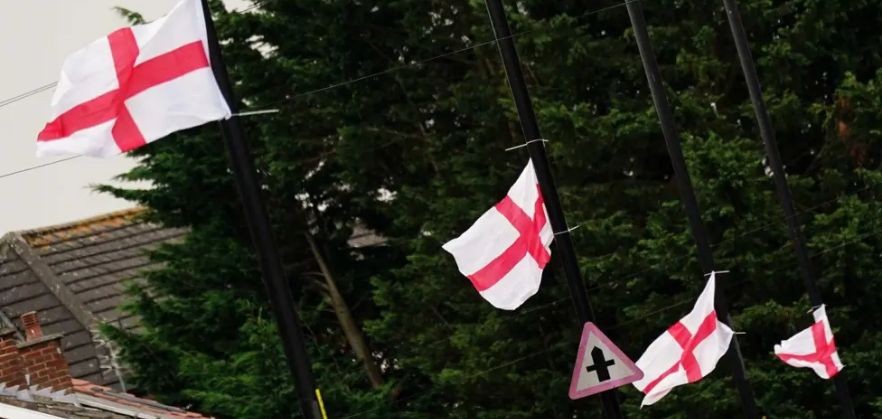
by MWNUK Team
Red crosses painted on roundabouts and the streets lined with England flags have stirred debates on whether this symbolises pride or prejudice. Where traditionally flags represent unity of a nation, it can equally as witnessed presently be a divisive tool used to demarcate territory of who belongs.
The increasing appearance of St. George’s and Union Jack flags in anti-immigration marches with protesters carrying messages - ‘protect our people, protect our culture’, and ‘protect our kids’, has led to minoritised communities once again finding themselves on the border - vilified and marked as foreign.
There have been reports of anti-Muslim hate against those perceived or seen as visibly Muslim. This has consequently resurfaced fears around public safety. Earlier this week, Muslim Women’s Network UK (MWNUK) held an online discussion with its members asking: how safe they are feeling, whether any flags have popped up in their area, how supportive employers have been and what they would like for the government to do.
Muslim women who had taken part in the discussion expressed that the sentiments behind the current uprising of national flags is different from national pride. The flags personify a sense of intimidation and an exclusion of those who do not have white privilege. As a Muslim woman revert explains how her life was like before and after wearing the hijab.
“Seen from both sides of the fence – what it was like being a non-Muslim and where the rhetoric goes and I’ve seen what is like for hijabi Muslim…before I had put the scarf on, had white privilege.”
The resurgence of flags has triggered past racial trauma, especially for those who had grown up in the 1970s. For these Muslim women, it was a potent reminder that they still remain on the fringes of society.
“Been here since I was six, my children are born here, my father was here in the early 20s – how long do I have to be here…when are we going to be recognised for the work we’ve done – it’s like snakes and ladders –you go up some level of understanding then come crashing down because there’s no base.”
Some had spoken about their fear when going out. Changing their daily routines due to concerns around their safety and that of their family, as they had previously experienced racism and Islamophobia.
“I’m finding it as a visibly Muslim woman, I’m changing my daily actions in light of the landscape and current climate were in.”
“Don’t want to put myself in any undue risks...same for my family, children and elderly parents.”
“Psychological safety – we don’t have that anymore, we hear about what is happening to others…the sikh lady who was raped.”
“Feeling anxiety for self and children.”
“My children have experienced racism and Islamophobia.”
Such concerns over safety has led to changes in behaviour, including taking off the hijab, not going out for walks, hesitancy in using local transport and impact on work productivity. For one Muslim woman in particular the flags and protests has increased her paranoia, heightening alertness to changes in local area:
“In the last year, particularly in my area there are a lot more XL bully dogs, and it’s made me really paranoid – is this linked...is this where it is going...so many aggressive types of dogs. I don’t go for walks because of that.”
“Puts you in this fight and flight mode – cannot concentrate on at work. Effecting productivity...it’s stalls your progress in whatever you’re doing.”
Political silence and mainstream media were perceived to bolster dangerous narratives on Muslims. All of which has enabled people to candidly make bold anti-Muslim and anti-immigration statements.
“Mainstream media normalising things…people able to voice such stereotypes – i.e. Muslims in Britain are taught to hate – nobody was challenging them.”
“Government does not seem to be doing anything.”
“I’ve seen people wearing t-shirts – if this t-shirt offends you, I’m happy send to you back home.”
Amongst these Muslim women was determination to not be overpowered, to speak out, as the closing remark from one of them was - "if we don’t highlight – shine a light on this issue, people are not going to know the real lived impact." Suggestions were put forward on how Muslim women’s voices can be heard and what can be done to ensure safety:
- Inclusion: for Muslim women to share their stories engaging with mainstream media to provide a counter narrative.
- Solidarity: not allowing far-right groups to exploit use of St. George’s and Union Jack flags for their own political gains. Being confident in seeing the national flags as being part of their national identity and heritage.
- Taking action: writing to local councillor and MP to raise attention to experiences of anti-Muslim hate and advocate for action.
- Reporting: to take practical steps engaging with platforms for reporting anti-Muslim hatred both online and offline.
If lived impact is not highlighted then the true scale of hatred and discrimination experienced by Muslims will always be underestimated. As grimly highlighted in a report MWNUK published, following the summer riots of 2024 - 80% of Muslims do not report hate incidents. For that reason, and in response to recent escalation of racism and intimidation shown in the flag campaign, they are launching a new service, Muslim Safety Net. This platform will be going live in October to provide Muslims – women and men - to come forward and report anti-Muslim incidents.
Join Our Movement
Raise your voice and get connected

 0
0